THE TWELVE CAESARS
ACTA ACCLA, June 2005
TIBERIUS
Emperor 14 - 37 CE
Text By Merrill Gibson
Tiberius (Tiberius Caesar Augustus, earlier Tiberius Julius Caesar, born Tiberius Claudius Nero in 42 BC, died 37 CE, ruled 14-37 CE) was the second emperor of Rome. His rule is significant to historians for several reasons. His accession is the first succession to occur in the Principate. Also, the period of his rule serves as backdrop for most of the events related by Christian and Muslim holy books as occurrences in the life of Jesus of Nazareth. Additionally, some of the central problems of Roman Imperial government first emerged during his rule.
Tiberius' accession was a critical and troubling time for the Romans. Would the stability that Augustus had brought to the empire survive? Would the Big Lie (that the Principate was a return to Republican principles of government, rather than the continuation of the dictatorial rule of the imperators) come apart, and with it the recent peace? There was little in Tiberius' character, or in his actions during the succession period, that could have brought Romans much comfort.

Emperor Tiberius
Tiberius himself was clearly uncomfortable being a possible successor to Augustus, although at no point did it appear that Tiberius was Augustus' first choice. At one point, Tiberius removed himself from the center of power and his responsibilities by moving to the island of Rhodes. This self-destructive act angered Augustus, and would likely have ultimately resulted in severe punishment or death for Tiberius, had not a series of deaths of other potential successors occurred, leaving Tiberius the only reasonable candidate to replace Augustus. It must be said in Tiberius' defense that he was not without his reasons for wanting to escape his stepfather Augustus. In nearly constant maneuvering in preparation for succession, Augustus danced Tiberius on the end of a string. Augustus even forced Tiberius to divorce his beloved wife Vipsania Agrippina and marry Augustus' daughter Julia. Tiberius was later forbidden even to see Vipsania. The union with Julia was extremely unhappy.
Tiberius' discomfort with his role as successor was apparent during succession ceremonies. In an apparent attempt to mimic Augustus' politically skilful ploy of publicly appearing to resist power while nonetheless grasping all of it that he could, Tiberius instead put on such a show of refusal that it left players in the staged succession ceremonies unsure of their roles, turning the ceremonies into obvious farces.
Despite its shaky start and Tiberius' inherent inadequacies, the first few years of his rule were relatively successful. He obviously had significant leadership skills, having been by all accounts an excellent general in important military campaigns prior to his accession. Early in his rule, he successfully put down two military revolts, and his administration of Roman provinces, as was apparently the case throughout most of his rule, was enlightened. He also wisely chose not to expand the empire, something which Roman resources at that time would not have supported.
Tiberius' insecurities, however, came to be the dominant factor in his rule. The Prefect of the Praetorian Guard, L. Aelius Sejanus, through sycophancy and some genuine administrative skill, maneuvered himself into position as Tiberius' closest advisor. In that role, he played on Tiberius' tendency to paranoia and self-isolation. Sejanus was able to deceive Tiberius into believing that multiple plots against the emperor were in progress. Sejanus' manipulations all had the purpose of increasing his own power and eliminating potential rivals. In one case, Sejanus probably conspired with Tiberius' daughter in law to murder Tiberius' son Drusus, who Sejanus feared was jealous of Sejanus' power. Sejanus was able to move Tiberius to action on many occasions, causing him to remove many people from his affection and from political power, and at one point getting himself selected consul along with Tiberius, a position which made his selection as successor to Tiberius probable. Under Sejanus' influence, Tiberius decided to move to the island of Capri, mimicking his earlier retreat to Rhodes, leaving Sejanus as effective emperor of Rome. Tiberius was to isolate himself on Capri for almost the entire remainder of his life; Sejanus' grasp on power, however, was not to last this long.

Emperor Tiberius in Profile
Tiberius turned on Sejanus, perhaps because he discovered Sejanus' role in his son's murder, an explanation Tiberius himself put forth. However, the real reason is far from clear. It may have simply been another manifestation of Tiberius' paranoia. In any case, Tiberius oversaw the purge of Sejanus and his followers, ordering cruel and summary deaths for many of them.
Tiberius' final years were marked by extreme isolation and depression. He was ruler of the empire in name only - Augustus' administrative machinery ruled Rome in actuality during this period. Tiberius' disconnection from events included his dereliction in the matter of his succession. Gaius (Caligula) essentially fell into the role of emperor on Tiberius' death, rather than having actively been groomed for and placed in that role.
Tiberius' rule illustrates several inherent problems of Roman Imperial government. The problem of succession, evident in both Tiberius' accession and the succession to his rule, was to remain unsolved throughout Roman history. One of the potential weaknesses of an appointed ruler was also made apparent. Tiberius was the first Roman ruler since the much earlier days of the Roman Kingdom to be appointed. Intervening rulers were either elected or had to claw their way to power. Despite the differences between these two latter methods, both made it highly likely that the ruler who emerged had a relatively clear grasp on reality. Tiberius' mental instability was to be echoed in much worse form in some of his successors. Finally, the problem of the concentration of power in one man's hands was made evident in the Sejanus affair and its sequelae, and was to be made evident many more times in the history of Rome.
As for the coinage of Tiberius, his precious metal issues were very limited in number, and all struck at Lugdunum. By far the most famous is the denarius featuring a seated woman (variously suggested to be Tiberius' mother Livia, Pax, or Ceres) on the reverse (see photograph above). It is believed by many that this is the "Tribute Penny" referred to in the Gospel of Saint Mathew 22, 17-21. However, this is disputed by several scholars.
Tiberius' base metal Imperial coinage (there were also widespread provincial issues), struck mostly in Rome, includes some very attractive types. Particularly well done is a ~39mm sestertius struck in the name of Tiberius' son Drusus. The obverse shows Drusus' newly born twins emerging from crossed cornucopias.
. A good portion of Tiberius' coinage honors the deified Augustus. Portraiture on his coinage, all done in a Hellenistic, non-idealized style, typically shows facial and hairstyle features in common with Augustus' coinage portraiture. None of Tiberius' coins extol a personal achievement of his, although some recount beneficial actions of his administration.
Merrill Gibson is a member of ACCLA and is the proprietor of Apollo Numismatics.
SUGGESTED WEB RESOURCES ON TIBERIUS
Tiberius on De Imperatoribus Romanis
Tiberius on Wikipedia
Suetonius, The Lives of the Caesars - The Life of Tiberius (English)
Suetonius, De Vita Caesarum - TIBERIVS (Latin)


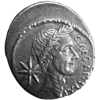 Julius Caesar
Julius Caesar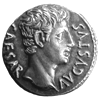 Augustus
Augustus Tiberius
Tiberius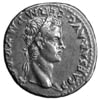 Caligula
Caligula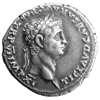 Claudius
Claudius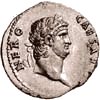 Nero
Nero Galba
Galba Otho
Otho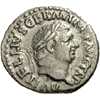 Vitellius
Vitellius Vespasian
Vespasian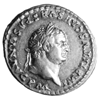 Titus
Titus Domitian
Domitian
